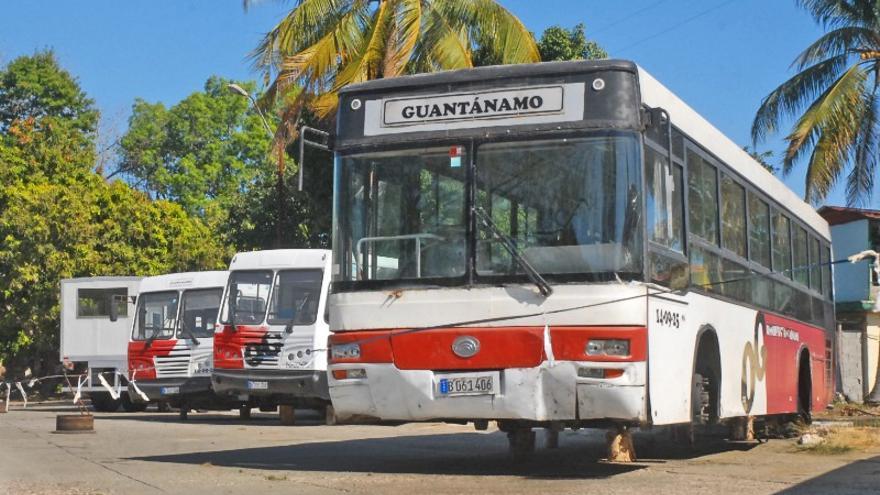
![]() 14ymedio, Havana, 29 March 2023 — The leasing of 26 “underutilized” state vehicles, with which the Guantánamo Urban Bus unit planned to cover the transport deficit in the province, has been ineffective. The drivers often fail to comply with schedules and skip mandatory stops, and managers have threatened more than once to terminate their contracts, according to the local press.
14ymedio, Havana, 29 March 2023 — The leasing of 26 “underutilized” state vehicles, with which the Guantánamo Urban Bus unit planned to cover the transport deficit in the province, has been ineffective. The drivers often fail to comply with schedules and skip mandatory stops, and managers have threatened more than once to terminate their contracts, according to the local press.
Rubén Pico Judiones, director of this organization, lamented the origin of the problem: of the 74 buses that Guantánamo has, only 33 work. This forces the them to look for alternatives and to request the rental of “paralyzed” buses from several companies — under Resolution 207/2021, which facilitates the rental of vehicles — to cover several routes in the city and others that lead to the peripheral towns of Paraguay, Cecilia, Maqueicito, Maquey, La Jabilla, Boquerón, Cayamo and Hatibonico.
In addition, Pico details, four “private sector” vans were rented to connect some areas, and help was requested from various sectors to “support” the transportation of workers. “All that is still insufficient,” the manager admitted.
Pico indicates the conditions under which the drivers of leased vehicles operate. They must charge a fare of five pesos and make three trips in the morning and three in the afternoon. In addition, they have the duty to cover certain routes at a set time. “Once they comply, they have the freedom to perform other work to increase their income,” he says.
However, that kind of gap in their obligations allows them to treat the work schedule with “flexibility.” Ómnibus Urbanos began to take measures, such as inspections and “intermittent” controls, Pico says, aimed at surprising the drivers during their non-compliance. But even that hasn’t solved the problem. “They were warned about the possibility of losing their jobs if violations of the regulations persist, but we are certainly still dissatisfied with the results,” he says.
It is common to see buses that circulate empty in the city with the sign of “Leased,” and others that don’t go to the established stops because “they prefer to go to places that generate more income,” says Pico.
“We are dissatisfied with the results,” he insists, because no matter how many measures are taken, “the violations persist.”
As if that were not enough, these vehicles are subject to the same difficulties experienced by the entire transport sector: the need to replace tires, a lack of spare parts, battery problems and a lack of supplies for maintenance. For that reason, he says, “about 30 buses are still parked in the unit.”
Nor have State employees who have the use of State-owned cars been helping the crisis. Picking up passengers at stops [along their own routes to and from work] “is not a favor, it’s an obligation” of the leaders, Pico complains. “The population must denounce those empty vehicles and indicate the license number and the time to identify them, thereby contributing to control from popular action.”
The manager believes that there should be a stricter law to apply to the “insensitive” who, driving State cars and buses, pass by the stops full of impatient passengers. Sometimes, he says, they don’t even stop at the inspector’s signal. “To date, only one contract is in the process of litigation for non-compliance with the State mandate,” he reports.
“Undoubtedly, leasing the buses for their repair and operation by new forms of management is a measure that could be effective in favor of public passenger transport, but there must be demand,” he concludes.
The Communist Party newspaper in the province has collected the reports of several citizens who reveal the true gravity of the matter. Waiting for several hours and humiliating treatment by the drivers are their daily bread.
“We were confident that the rented buses would change the situation, but really the panorama is worse and increasingly complex for those of us who depend on public transport,” said one of the interviewees. Another said that they felt “mocked” by the drivers who drove by the stops with a “Leased” sign and refused to pick them up.
The conclusion of the guantanameros is clear: the State does not guarantee the “stability of urban transport” and propitiates — with the lack of controls and bureaucracy — the growing corruption of the sector.
Translated by Regina Anavy
____________
COLLABORATE WITH OUR WORK: The 14ymedio team is committed to practicing serious journalism that reflects Cuba’s reality in all its depth. Thank you for joining us on this long journey. We invite you to continue supporting us by becoming a member of 14ymedio now. Together we can continue transforming journalism in Cuba.
